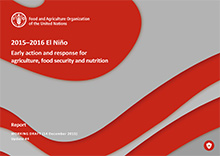2015–2016 El Niño: Early action and response for agriculture, food security and nutrition
 The Food and Agriculture Organization of the United Nations (FAO) has as its Strategic Objective 5 to “Increase the resilience of livelihoods to threats and crises”. In support of its national counterparts, FAO aims to address the current and future needs of vulnerable people affected by the 2015‒2016 El Niño event. It is widely recognized that by striking before a crisis has escalated into an emergency, disaster losses can be reduced and emergency response costs significantly decreased. Early actions strengthen the resilience of at-risk populations, mitigate the impact of disasters and help communities, governments and national and international humanitarian agencies to respond more effectively and efficiently. The increase in climate-related disasters from an El Niño event is particularly important for FAO’s mandate. A recent ten-year analysis led by its Climate, Energy and Tenure Division showed that 25 percent of all damage caused during natural disasters is in the agriculture sector. In drought alone, agriculture is the single most affected sector, absorbing around 84 percent of all the economic impact. In this report, FAO provides a global analysis of the current and expected evolution of El Niño-related disasters and its impact on agriculture, food security and nutrition. It aims to give a consolidated outlook of the situation and the early actions being taken by governments, partners and FAO. In view of the rapid evolution of the phenomenon, the report will be subject to regular updates.
The Food and Agriculture Organization of the United Nations (FAO) has as its Strategic Objective 5 to “Increase the resilience of livelihoods to threats and crises”. In support of its national counterparts, FAO aims to address the current and future needs of vulnerable people affected by the 2015‒2016 El Niño event. It is widely recognized that by striking before a crisis has escalated into an emergency, disaster losses can be reduced and emergency response costs significantly decreased. Early actions strengthen the resilience of at-risk populations, mitigate the impact of disasters and help communities, governments and national and international humanitarian agencies to respond more effectively and efficiently. The increase in climate-related disasters from an El Niño event is particularly important for FAO’s mandate. A recent ten-year analysis led by its Climate, Energy and Tenure Division showed that 25 percent of all damage caused during natural disasters is in the agriculture sector. In drought alone, agriculture is the single most affected sector, absorbing around 84 percent of all the economic impact. In this report, FAO provides a global analysis of the current and expected evolution of El Niño-related disasters and its impact on agriculture, food security and nutrition. It aims to give a consolidated outlook of the situation and the early actions being taken by governments, partners and FAO. In view of the rapid evolution of the phenomenon, the report will be subject to regular updates.
